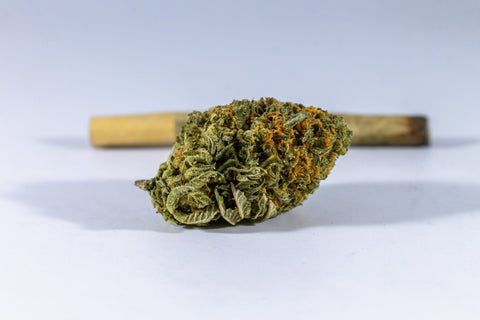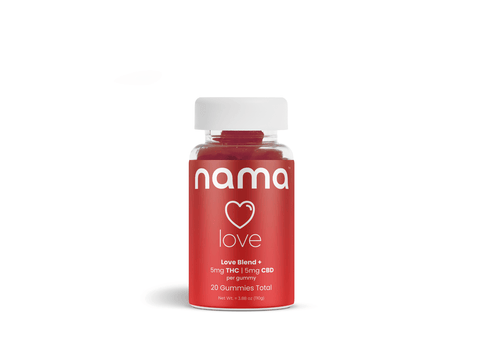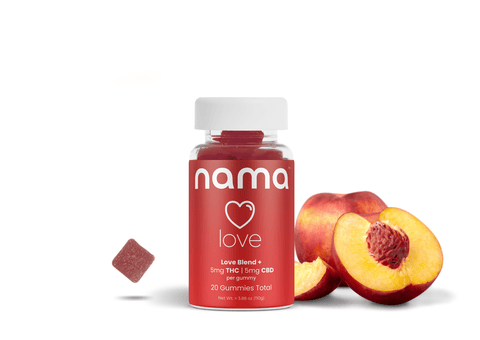
We know all about the therapeutic properties of Delta 9 THC for dementia—but what about Delta 9’s “younger sibling,” Delta 8?
Similarly to Delta 9, small amounts of Delta 8 THC seem to help alleviate the symptoms of dementia such as memory loss, cognitive decline, anxiety, and disrupted sleep.
Research on Delta 8 reveals some promising neuroprotective abilities that could reduce inflammation, defend neurons, and possibly even heal damage. For those facing neurological conditions such as dementia, these protective powers may be game-changing.
Before we continue, here’s our in-depth look at Delta 8 THC and all its therapeutic potential.


THC: 10 mg | CBC: 10 mg | CBD: 10 mg | CBG: 5 mg | CBN 5mg
What is dementia?
Dementia is not a single disease, but rather an umbrella term describing a group of symptoms that impair thinking, behavior, and the ability to perform everyday tasks. It is caused by damage to brain cells. Over time, the damage worsens as more brain cells become affected.
Dementia can also develop when infections or diseases, such as Alzheimer’s, attack the parts of the brain involved in memory, learning, decision-making, or language. In both cases, dementia degrades communication between different brain regions.
Depending on the underlying cause, dementia progresses differently but often brings changes in mood, emotions, personality, and social behavior as well as impaired cognition.
What are the symptoms of dementia?
People with dementia typically show some of the following symptoms:
- Memory loss
- Difficulty completing familiar tasks or following known routes
- Disorientation regarding time, places, and situations
- Problems with language
- Impaired visual and spatial abilities affecting coordination
- Withdrawal and changes in mood and personality
- Loss of impulse control
- Confusion
- Eventual inability to speak, move, or perform basic self-care
What types of dementia are there?
Alzheimer’s disease is the most common type of dementia. Interestingly, all patients with Alzheimer's disease have dementia, but not all dementia patients have the underlying brain changes of Alzheimer's.
Other types of dementia include:
- Vascular dementia: a stroke or small vessel disease can impair the blood to the brain, leading to slowed thinking and trouble with focus.
- Frontotemporal dementia: involves damage to the frontal and temporal lobes of the brain. These two regions are important for personality, behavior, language, memory, judgment, and impulse control.
- Lewy body dementia: abnormal protein deposits called Lewy bodies damage brain cells involved in thinking, memory, and behavior.
- Creutzfeldt-Jakob disease: a rare and fatal type of dementia where memory, behavior, and coordination rapidly decline.
People with Parkinson’s and Huntington’s diseases can gradually develop dementia symptoms as their diseases progress. Wernicke-Korsakoff syndrome disrupts memory formation. It is often linked to heavy alcohol abuse. Traumatic brain injuries can also cause dementia. This type is most often seen in football players, boxers, soldiers, and people involved in vehicle accidents.
Is there a cure?
As there is currently no cure for dementia, available treatment focuses on improving symptoms and slowing the rate of decline. Common approaches include cholinesterase inhibitors, memantine, antidepressants, and antipsychotics which temporarily stabilize cognitive abilities, inhibit brain damage, and manage mood.
In the absence of definitive treatments to stop or reverse dementia, people have turned to the therapeutic compounds from the cannabis plant as a supplementary approach to alleviate the symptoms and improve quality of life. One of those is Delta-8-tetrahydrocannabinol.
What is Delta 8 THC?
Delta 8 is a minor cannabinoid found in the cannabis plant in small concentrations. It is chemically similar to Delta 9 THC but with less intoxicating effects. That’s why it’s often referred to as the “nicer younger sibling” of Delta 9.
Most delta-8-THC users experienced a lot or a great deal of relaxation (71%); euphoria (68%) and pain relief (55%)... Delta-8-THC may provide much of the experiential benefits of delta-9-THC with lesser adverse effects. (Kruger and Kruger)
See our side-by-side comparison of Delta 8 and Delta 9 THC to learn more.
Delta 8 THC can either be natural or synthetic. Natural Delta 8 is extracted from the plant, but these concentrations are too low. Despite its similar chemical composition to Delta 9, Delta 8 is made synthetically from cannabidiol (CBD), another major cannabinoid. This involves using organic solvents to reflux CBD and change its chemical makeup.
There are many ways you can consume Delta 8: in chocolates, cookies, tinctures, vape cartridges, and infused beverages. However, our favorite—and safest—method is with Delta 8 Elevate gummies. They contain small amounts (12.5 mg per serving) that allow you to easily control your dosage and experience the benefits of low-dose Delta 8 without any adverse effects.
That’s the beauty of microdosing cannabis: you experience the therapeutic benefits without overwhelming your senses. Small amounts of cannabis achieve that pleasant, mellow buzz that relaxes the mind and body without impairment or intoxication.
Let’s see how Delta 8 works.
How does Delta 8 interact with the endocannabinoid system?
Like all cannabis compounds, Delta 8 binds to cannabinoid receptors in the endocannabinoid system (ECS). The ECS is a biological system in our bodies that helps regulate many vital functions: sleep, pain, appetite, mood, and cognitive performance, among others.
Cannabis compounds such as Delta 9, CBD, and Delta 8, interact with this system and its receptors (CB1 and CB2) to modulate these vital functions, alter the release of neurotransmitters (chemical messengers that allow communication between neurons), and the activity of neurons.
By activating CB1 cannabinoid receptors—which are found primarily throughout the brain—Delta 8 can reduce neuroinflammation, excitotoxicity, and oxidative stress, key processes involved in neuronal damage and death.
There are many ways in which Delta 8 helps people with dementia fight the disease and alleviate the symptoms. Let’s take a deeper look into its potential neuroprotective properties.
What are the benefits of Delta 8 for dementia?
The science is still early, but based on what we know about its therapeutic potential, Delta 8 appears to confer neuroprotective superpowers that could help shield neurons from dementia's damaging effects.
Delta 8 THC may have the ability to:
- Sharpen memory and learning
- Curb agitation
- Lower depression and anxiety
- Reduce chronic pain
- Lower inflammation in the brain
- Improve sleep
- Improve appetite
Delta 8 may protect neurons against damage and degeneration
One of the most exciting properties of Delta 8 is its potential to shield brain cells against the neuronal damage and death that drives the progression of dementia. Its neuroprotective abilities stem from the interaction with the ECS. Delta 8 partially agonizes CB1 and CB2 receptors, which regulate neural communication and brain cell function.
Here’s how Delta 8 may confer these neuroprotective effects:
- Delta 8 stimulates the release of neurotrophic factors like BDNF which support neuron growth and development. It may even promote neurogenesis—the creation of new neurons—to replace ones lost in dementia. (Its cousin, Delta 9, is another powerful neurogenic agent.)
- Delta 8 may also activate neuroprotective mechanisms involved in protein homeostasis. It can upregulate heat shock proteins and autophagy to prevent the buildup of abnormal proteins (e.g., beta-amyloid and tau) and defend against dementia neuropathology.
- When Delta 8 activates CB1 receptors, this can inhibit excessive glutamate release or excitotoxicity. Excitotoxicity is the overstimulation of neuronal cells by glutamate, the primary excitatory neurotransmitter. When your brain produces more glutamate than it needs, the excess can overexcite neurons and trigger inflammatory cascades that damage cell structures, potentially leading to cell death.
Inflammation is another enemy of cognition. Luckily, small amounts of cannabis seem to have powerful anti-inflammatory properties that could protect our neurons and slow down cognitive degeneration as seen in people diagnosed with dementia.
Delta 8’s anti-inflammatory properties
Delta 8 demonstrates powerful anti-inflammatory abilities. Neuroinflammation is a major culprit in many types of neurodegenerative diseases. To tamp down the inflammation-inducing cytokines and free radicals (that can harm neuron cell membranes and DNA), Delta 8 binds to CB2 cannabinoid receptors on immune cells.
Here’s why these anti-inflammatory properties of Delta 8 are so important for dementia patients:
- Lowered neuroinflammation may reduce dysfunction of the blood-brain barrier. The blood-brain barrier (BBB) is a semi-permeable membrane that prevents substances such as toxins, antibodies, cells, and pathogens from entering the brain and spinal cord tissue. Chronic neuroinflammation can impair the function of the BBB, making it more susceptible to neuronal damage. By reducing inflammation in the brain, Delta 8 protects neurons from infiltration of immune cells, antibodies, and toxins.
- Delta 8 also exhibits antioxidant effects that fight oxidative stress. Oxidative stress refers to the accumulation of reactive oxygen species (ROS) or free radicals that can damage proteins, cell membranes, and genetic material within neurons. The more ROS in your body, the higher the chance of brain cell death. As an antioxidant, Delta 8 sweeps up these free radicals and quenches oxidative stress to stimulate neuron health and regrowth.
Our Elevate gummies are a great way to harness these anti-inflammatory and antioxidant properties of Delta 8 to support brain health. Get your daily dose of Delta 8, so you can protect your cognitive faculties from further decline.
Delta 8 may improve memory and cognitive functioning
One of the first and most heartbreaking symptoms of dementia is the progressive erosion of memory and thinking skills. Simple forgetfulness advances to getting lost in once-familiar places and becoming unable to perform routine tasks. Pretty soon, it becomes a challenge to even recognize close family members.
Delta 8 could put the brakes on this tragic loss of memory and cognition. Delta 8 had positive effects on memory and learning in animal studies, counteracting cognitive decline seen in dementia.
While more research is needed, here’s what we know so far:
- Small doses of Delta 8 can boost short-term memory retention in mice.
- Delta 8 can improve the learning behaviors of older mice at the highest risk for dementia.
- Delta 8 may actively sharpen mental faculties such as attention, planning, and decision-making that slip away in dementia.
- Scientists think Delta 8 works by enhancing communication between neurons in the hippocampus and frontal cortex, areas critical for cognitive functions weakened by dementia progression.
While mouse studies can't be directly translated to humans, the fact that Delta 8 bolstered memory and learning in animal models demonstrates its promising neuroprotective capacities.

Product QUIZ
Need help deciding what product is best for you? Take our quiz, just three questions until your perfect match!
The calming effects of Delta 8
Agitation in patients with dementia is one of the most common problems they face. The reasons why people diagnosed with dementia experience it are complex, but damage to the brain areas that regulate mood and emotions is believed to be crucial.
Delta 8 THC activates cannabinoid receptors in the brain to produce anxiolytic (anti-anxiety) effects and boost mood. Its mildly euphoric effects may also have a calming influence on dementia patients. Its subtle high seems to promote the relaxation of the mind and body without strongly impairing cognition.
By alleviating some of the emotional distress of dementia, Delta 8 may help patients retain a sense of calm.
The analgesic effects of Delta 8
Dementia can cause significant physical pain. Headaches, joint and muscle aches, and nerve pain are common issues patients face. The reasons for this pain involve changes in the brain's pain processing pathways and the physical effects of muscle tension and reduced mobility.
Delta 8 THC acts on cannabinoid receptors involved in pain modulation. It activates CB1 and CB2 receptors in the brain, spinal cord, and immune cells to influence the way the body perceives and responds to painful stimuli.
More human studies are needed, but preliminary evidence suggests Delta 8 can dampen chronic pain in dementia, significantly improving the quality of life and reducing suffering for both patients and caregivers coping with this disease.
Do you know another great way to say goodbye to chronic pain? Our low-dose cannabis edibles may reduce pain in a gentle and natural way, allowing you to stay active and engaged with your loved ones. Try our Bliss Delta 9 gummies with balanced ratios of THC and CBD to experience all-day relief.
Did you know that only 5 mg of Delta 9 can make you pleasantly buzzed without unwanted side effects?
How Delta 8 improves sleep in dementia patients
Sleep disturbances are very common in dementia. Decreased ability to sleep through the night disrupts normal sleep-wake cycles. Delta 8 THC regulates sleep by increasing total sleep time and enhancing slow-wave and REM sleep stages vital for memory consolidation and learning.
The relaxation and anti-anxiety properties of Delta 8 likely also make it easier for dementia patients to fall asleep and stay asleep.
Getting adequate deep, restorative sleep is crucial for neuronal health and cognitive function. Order our Delta 8 gummies and maintain a healthy circadian rhythm to enhance mood and quality of life for patients coping with dementia's toll.
Delta 8 improves appetite in people with dementia
Appetite loss and unintended weight loss are very common issues in dementia. Patients often experience a loss of taste and smell—which is a common side effect of dementia medication, depression, and changes in hunger signaling.
But Delta 8 has got your back. By activating CB1 receptors, especially in the hypothalamus, Delta 8 stimulates hunger signals. Some anecdotal evidence suggests Delta 8 also reduces nausea and vomiting often found in dementia patients which can further aid food intake.
A stimulated appetite can help prevent dangerous weight loss, muscle wasting, and nutritional deficiencies. For patients struggling with low appetite and food avoidance behaviors, Delta 8 may help restore interest in eating.
It’s no wonder Delta 8 is so good at stimulating appetite. Are you familiar with the munchies? That’s how cannabis affects appetite: it increases hunger signals and makes food taste and smell more appealing.
Our Euphoria Delta 9 gummies harness this munching effect of THC to naturally boost appetite without unwanted highs.
Does Delta 8 help with Alzheimer’s?
As we mentioned before, Alzheimer's disease is a common form of dementia marked by specific biological indicators such as amyloid β (Aβ) plaques and neurofibrillary tangles (NFTs). It is associated with neuroinflammation, protein misfolding, endoplasmic reticulum (ER) stress, and neuronal cell death.
A 2023 study explored whether Delta 8 THC, when applied before exposure to Aβ1-42 (a substance associated with Alzheimer's disease), had neuroprotective properties that could fight Alzheimer’s. The results suggested that Delta 8 pretreatment led to the restoration of cell viability in the neuroblastoma cells that were treated with Aβ1-42.
In contrast, the cells pretreated with Δ8-THC displayed a reduction in ER stress, leading to a decrease in neuronal cell death. The results suggest that Delta 8 could potentially function as a neuroprotective agent in Alzheimer's disease by mitigating ER stress and its adverse effects, including neuronal cell death.
Many cannabis compounds share the neuroprotective properties of Delta 8. Microdosing THC and CBD seems to be therapeutic for Alzheimer’s disease by reducing inflammation, inhibiting neural damage, and even stimulating neuron regrowth. Tap safely into these medicinal benefits of low-dose cannabis and get your THC gummies pronto.
How much Delta 8 should you consume?
Delta 8 research is still in the early stages, so there are no official guidelines for dosing it specifically for dementia relief. What we rely on is the good old “start low and go slow” approach. Small amounts of Delta 8 are the best way to go if you’re new to microdosing or you want to experience the benefits in the long run.
Our Elevate gummies contain only 12.5 mg of Delta 8 per gummy, making them a safe and reliable option to avoid overconsumption and intoxication. If it’s your first time munching on edibles with Delta 8, you can even go lower than that—take a bite of the gummy and cut down on the dosage. When you feel ready, you can increase slowly.
Here’s our guide to Delta 8 dosage for more on the topic.
Don’t forget to monitor your reactions for possible side effects such as dry mouth or dizziness. If you do experience any, reduce the dosage.
Is Delta 8 legal?
Delta 8 THC is federally legal in the U.S. if the products containing it are compliant with the 2018 Farm Bill. This means they have to:
- Be derived from hemp, not marijuana
- Contain no more than 0.3% of THC by dry weight
These conditions make Delta 8 legal on a federal level. However, it is illegal in the following fourteen states:
- Alaska
- Arkansas
- Arizona
- Colorado
- Delaware
- Iowa
- Idaho
- Kentucky
- Montana
- Mississippi
- New York
- Rhode Island
- Vermont
- Utah
All nama CBD products, including our Delta 9 edibles, are compliant with the conditions set by the Farm Bill. This makes all our Delta 8 and Delta 9 THC products federally legal in the US.
Delta 8 FAQ
Behavioral symptoms in dementia come with a wide array of manifestations such as:
- Agitation: restlessness or pacing
- Aggressive behaviors: verbal or physical aggression
- Wandering: aimless movement, disorientation, or attempts to leave the familiar environment
- Sleep disturbances: sleeping at night, increased daytime napping, or disturbances in the sleep-wake cycle
- Disruptive behaviors
These symptoms greatly impact an individual's actions and interactions, often creating challenges for caregivers. Wandering behaviors could include. Sleep pattern changes might involve difficulties.
Psychological symptoms in dementia cover the following manifestations:
- Depression is the most prevalent psychological symptom, leading to feelings of sadness, hopelessness, or loss of interest in previously enjoyed activities.
- Anxiety may include feelings of worry, agitation, or fear.
- Hallucinations and delusions might lead individuals to see, hear, or believe things that aren’t present or real.
- Mood alterations and changes in personality are characterized by shifts in behavior or emotions.
High doses of Delta 8 THC can induce psychoactive effects when taken in excessive amounts, although they are generally considered milder compared to Delta 9. Delta 8 THC's psychoactive properties can lead to feelings of relaxation, altered perception, and mild euphoria. The psychoactive effects may differ based on your sensitivity, the purity and concentration of the product, and the method of consumption.
The best Delta 8 THC product is our low-dose edibles. Low-dose edibles are often favored because they offer precise dosing and sustained effects. These products are meticulously crafted, allowing for accurate and consistent dosage, crucial in avoiding unintended high doses, especially for beginners or those sensitive to THC.
The slow metabolization of edibles provides a prolonged and smoother experience, reducing the intensity of any psychoactive effects. This makes it a suitable option for those seeking a subtler, longer-lasting impact without sudden spikes in effects—which is great if you want to consume regularly every day.
Our low-dose edibles are discreet and convenient and perfect to consume in a more inconspicuous way, as they are easy to carry and consume without drawing attention.
There isn't concrete evidence that Delta 8 THC aids in studying. If you take it in excessive amounts, it might impede focus, concentration, and cognitive abilities necessary for studying. That’s why microdosing Delta 8 is the best thing for your brain and your academic work.
Small amounts of Delta 8 gently influence your endocannabinoid system to promote memory retention, focus, and overall cognitive performance. So avoid high doses of potentially psychoactive Delta 8 while studying or engaging in activities that require mental acuity. In fact, ditch the high doses and opt for our low-dose Elevate gummies.
There isn't substantial evidence directly linking Delta 8 THC to adverse effects on heart health. Given its potentially psychoactive properties and impact on blood pressure or heart rate, people with underlying heart conditions or those taking medications affecting heart function should use Delta 8 THC cautiously and stick to lower doses.
Top Sellers
New? Start with our Ultimate Sampler!

THC: 10 mg | CBC: 10 mg | CBD: 10 mg | CBG: 5 mg | CBN 5mg
Resources
Kruger, J. S., & Kruger, D. J. (2022). Delta-8-THC: Delta-9-THC’s nicer younger sibling? Journal of Cannabis Research, 4. https://doi.org/10.1186/s42238-021-00115-8
Ledvina, Kaitlin & Suelzer, Elizabeth & El-Alfy, Abir. (2023). Delta-8-tetrahydrocannabinol: a phytocannabinoid on the rise. RPS Pharmacy and Pharmacology Reports. 2. 10.1093/rpsppr/rqad031
Gugliandolo, A., Blando, S., Salamone, S., Caprioglio, D., Pollastro, F., Mazzon, E., & Chiricosta, L. (2023). Δ8-THC Protects against Amyloid Beta Toxicity Modulating ER Stress In Vitro: A Transcriptomic Analysis. International Journal of Molecular Sciences, 24(7). https://doi.org/10.3390/ijms24076598
nama CBD FDA & legal disclaimer
Our products are not intended as medical advice, diagnosis, or treatment of any disease. They are not a replacement for prescription medications and have not been evaluated by the Food and Drug Administration (FDA).
The information provided on this website does not and is not intended to, constitute legal advice or any statements of the status of any laws. Any information, content, and materials available on this site are for general informational purposes only and are not intended to be relied upon for any purpose.
Readers of this website should contact their attorney to obtain advice with respect to any particular legal matter including decisions on what products are, or are not, legal to sell, possess, or consume. No reader, user, or browser of this site should act or refrain from acting on the basis of information on this site without first seeking legal advice from their own counsel in the relevant jurisdiction.
Only your individual attorney can provide assurances that the information contained herein – and your interpretation of it – is applicable or accurate for your particular situation. Use of, and access to, this website or any of the links or resources contained within the site do not create an attorney-client relationship between the reader, user, or browser, and website authors, contributors, contributing law firms, or committee members and their respective employers.
About
Learn
Join us on this journey

© Copyright 2026 nama Products LLC. All Rights Reserved.
†These statements have not been evaluated by the Food and Drug Administration. These products are not intended to diagnose, treat, cure or prevent any disease. All information presented here is not meant as a substitute for or alternative to information from health care practitioners. Please consult your health care professional about potential interactions or other possible complications before using any product.
††The information provided on this website does not, and is not intended to, constitute legal advice or any statements of the status of any laws. Any information, content, and materials available on this site are for general entertainment purposes only, and are not intended to be relied upon for any purpose.

By clicking ‘Yes,’ you agree to our
Terms & Conditions and Privacy Policy
123 John Doe Street
Your Town, YT 12345
Store Hours
Sun: Closed
Mon-Fri: 9:00 - 17:00
Sat: 10:00 - 13:00
What to expect at pickup
Closed
Closing at 5pm
Closing at 5pm
Closing at 5pm
Closing at 5pm
Closing at 5pm
Closing at 1pm



![Euphoria Kiwi Raspberry [10ct]](http://www.namacbd.com/cdn/shop/files/nama_kiwi_raspberry_pouch.png?v=1715285056&width=480)
![Euphoria Kiwi Raspberry [10ct]](http://www.namacbd.com/cdn/shop/files/nama_euphoria_kiwiraspberry_nutrition_facts.jpg?v=1715873960&width=480)
![Euphoria Triple Berry [10ct]](http://www.namacbd.com/cdn/shop/files/nama_euphoria_triple_berry_pouch.png?v=1715286095&width=480)
![Euphoria Triple Berry [10ct]](http://www.namacbd.com/cdn/shop/files/nama_euphoria_tripleberry_nutrition_facts.jpg?v=1715873950&width=480)


![Buzz Drops™ [THC Drink Drops]](http://www.namacbd.com/cdn/shop/files/nama_thc_buzz_drops.png?v=1711412866&width=480)
![Buzz Drops™ [THC Drink Drops]](http://www.namacbd.com/cdn/shop/files/buzz-drop-wine-comparison.png?v=1736882023&width=480)
![Buzz Packs™ [THC and CBD Powder Drink Mix]](http://www.namacbd.com/cdn/shop/files/nama_buzz_packs_thc_drink_pack_white_background.png?v=1741884660&width=480)
![Buzz Packs™ [THC and CBD Powder Drink Mix]](http://www.namacbd.com/cdn/shop/files/Buzz_Packs_Label.png?v=1741884660&width=480)
















Comments (0)
There are no comments for this article. Be the first one to leave a message!